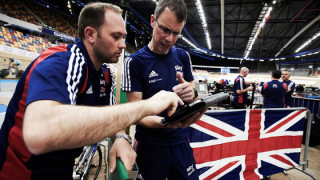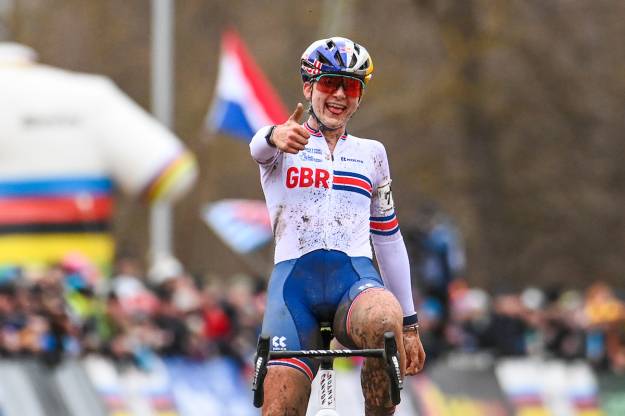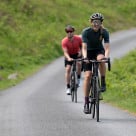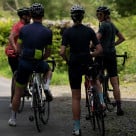Published: 15 August 2012![]()
Words: Simon Powers
Over the last few months, we have taken the opportunity to have a look at some of the staff who support the Great Britain Cycling team in the lead up to this summer's Olympic Games. After an event which showcased the Great Britain Cycling Team at its very best, we thought it would be fitting, in the final article of the series, to have a closer look at the way both data and rider performance are analysed both in training and in competition.
Above: Chris White (left) runs through some post-ride data with endurance coach Paul Manning
Working as part of a team, two of British Cycling’s performance analysts, Chris White and Will Forbes have the responsibility of monitoring every detail in the performance of some of the most successful cyclists of all time. Working for the Great Britain Cycling Team on behalf of the English Institute of Sport both White and Forbes are responsible for, in Chris White’s words, “the provision of effective feedback to coaches".
Chris goes into a little more detail as to their main roles: “This tends to be in the form of video or numerical data. Our aim is to help the coaching process and keep them informed on a performance level so ultimately, the athletes go faster. Performance Analysis is deeply rooted in the coaching process. It's not just about providing information but also having a good relationship with the coaches.”
“The type of work we do can be tactical analysis at, for example match sprint events, looking at our riders and their opponents looking for any patterns in the tactics that they employ during a race. Or in time trial events we also do a lot of splits analysis on both our riders as well as other teams.” Forbes adds.
They also work closely with biomechanist Paul Barrett along with the coaching staff to provide feedback on such things as positioning and technique.
“For example, in the Team pursuit, we will work with the coaches not only to help them devise strategies and schedules to get the best from the team but also to help them with rider selection and order,” explains White.
The job of the Performance Analyst is both based in the office, looking at collected data and video as well as in the heat of the field of play, where data is compiled ready for use either immediately or often for analytical work at a later date.
Will Forbes, who mainly concentrates on sprint events at the velodrome, explains: “In competitions, we tend to use a lot of video to produce our timing information. From known reference points on the track we can calculate accurate splits during a wide range of different events on the velodrome.”
The data is captured in the eaves of the velodrome and with their own private Wi-Fi networks they often set up can, if required, be processed and broadcast to the coaches in the field of play only a few minutes after the conclusion of each event. The data is tailored to the specific requirements so that in a fast paced event, for example, between rounds, just simple data such as accurate splits can be provided so as to de-brief the rider prior to the next round. This data can prove crucial in matters such as gear selection choice as well as rider selection and order mid-event.
Chris White, who usually concentrates on endurance events at the track explains what the data is used for: “For the team pursuits, for example, we are here for pretty much every training session where they are doing race-type efforts. We analyse everything from how the riders have ridden the event, what is the flow of speed. Across the team, what length turns have each rider done. This will go into getting the best out of the team but will also assist coaching staff in their ultimate selections. The way we crunch the numbers for a team pursuit is exactly the same, be it in training or at a major event. Therefore, you can go to any track in the world.”
CHANGES IN LAST FEW YEARS
In the last six track world championships, there has been at least two analysts covering each major track event from start to finish. It has become a well engrained sports science service with the team now, as Will Forbes confirms:" It's changed in the last few years in terms of our presence at the track. They always gave you a small area to work from but now, in terms of how the UCI see Performance Analysis, there is now an accredited area normally on the back straight but in London it's actually on the home straight which is nice.”
Now that performance analysis has become an everyday part of the process at the velodrome, it follows that a lot of nations use such sports scientists to collect data for that all important post event de-brief after each major event.
Forbes explains the scenario a little better: “In Melbourne at the last World Championships, there were 15 nations with PA representation at the track. It's a bit cloak and dagger up there; we all get along fine but don't give too many secrets away!"
“They all film our rides and we film theirs so that's just part of analysis. There have been instances of other nations trying to get screenshots of their competitors' data. We always keep an eye on what everyone else is doing but we have developed our own strategy with coaches on what data we use and how it's interpreted so we just look at the opposition’s within our own context really. You never really want to copy what the opposition is doing but it pays to keep an eye on what technology is being used by other nations,” added Chris White.
OLYMPICS
Both Chris and Will were accredited for the Games which is a great step since Beijing, when only one performance analyst was allowed to attend. This time, the BOA looked at the way Performance Analysis is used and the value it has and took, in White’s word’s “a no compromise approach allowing us to operate exactly the way we have been at recent world championships.”
During the course of the cycling events at the track, Will remained with the track team right up to the event whereas Chris started on the road race and time trials then headed to the velodrome as soon as that finished. Both of them then covered the BMX followed by the mountain bike at Hadleigh Farm.
“It is very different on the road so we just gave the riders some simple split times really. We had been down to the course a number of times as well as studying the information on line which was available to riders in advance. So we had some data on that already,” White explains.
This format was the same when they arrived at the mountain bike. “At the test event, we had four or five people there filming sections so we have spent a lot of time analysing that since as well as any training sessions we have had since on the track,” commented White.
In the same way that the mountain bike was a similar task to the road and time trial events, BMX was very similar to the track but with a more ‘no-frills’ approach adopted insofar as they didn’t have their own special area. “We were just in seats with an empty seat next to us so there was no tripod; just hand held footage on that one.” says White.
The video footage the analysts obtain has often proved vital on the track, especially in events such as the sprint and keirin. As the video can be available to coaches within a few minutes and played back on a tablet device, this has often proved invaluable on a number of occasions.
Chris White explains the crucial role this footage has often played: "The footage we capture is compressed and sent down to the coaching staff within a few minutes and displayed on a tablet device. This is often invaluable not to question commissaries' decisions but to gain clarity on a few things. There have been a few occasions where decisions have been overruled in our favour based on the video we shoot and also the speed with which we are able to get it down to track centre.”
At the conclusion of the final cycling event at Hadleigh Farm last Sunday, the job of the performance analysts is far from over as White explains: “We only had 2-3 days off during the entire games so we were definitely busy. After the games, it won't stop there, as time has already been set aside for a debrief with the coaches as well as time to reflect on how we have done everything during the last four years and, in what is a constantly evolving area of sports science, where we can improve for the next Olympic cycle.”









